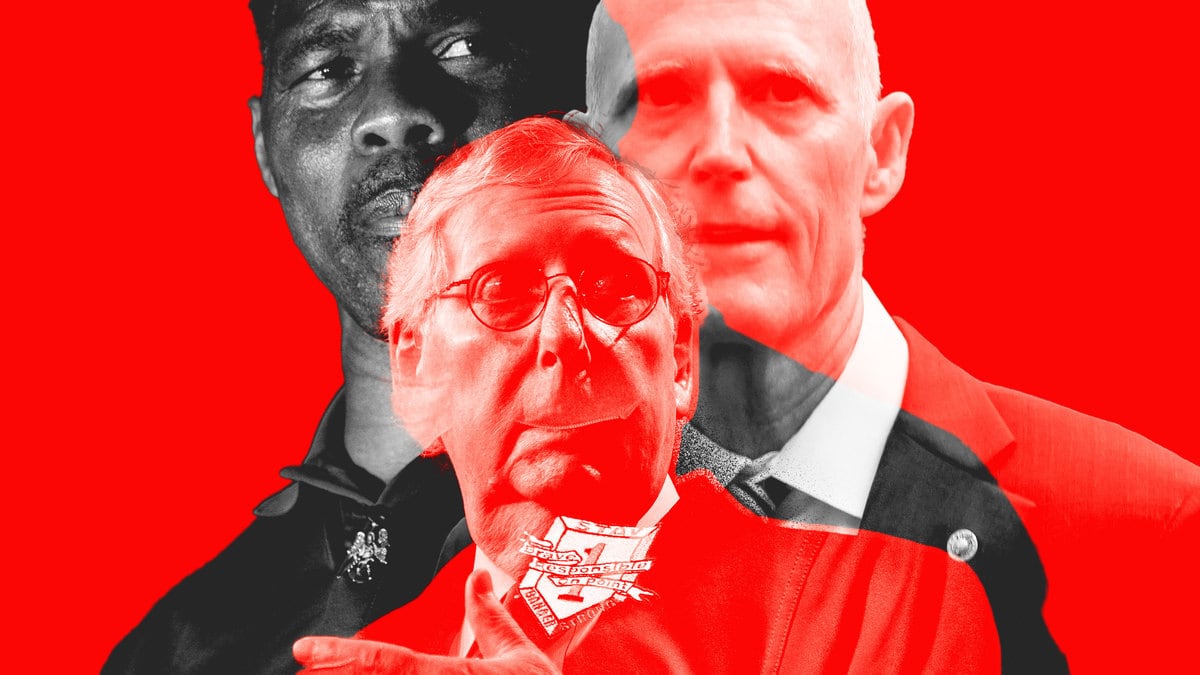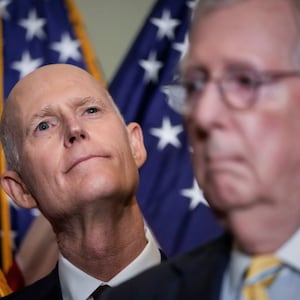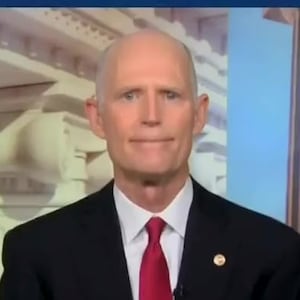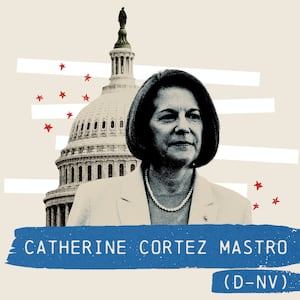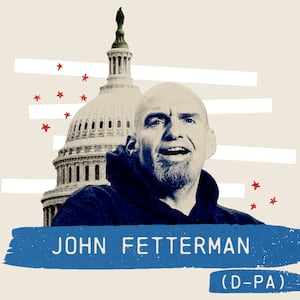In the wake of a disappointing midterm election performance, warring factions of Senate Republicans are publicly pointing fingers, trashing each other to the press, and agitating for changes in party leadership.
They’re doing everything, it seems, except focusing on the Georgia runoff election that is now less than three weeks away.
The outcome of the contest between Sen. Raphael Warnock (D-GA) and Republican Herschel Walker on Dec. 6 will determine whether Democrats will continue to run an effectively tied Senate, or whether they’ll expand their majority to 51 seats.
But the GOP’s defeats in four battleground Senate races have cost them their chance at the majority, no matter what happens in Georgia, sparking a wave of recriminations for the two men who helmed the party’s midterm strategy: Minority Leader Mitch McConnell (R-KY), and Sen. Rick Scott (R-FL), the chairman of the National Republican Senatorial Committee.
In the last week, McConnell’s allies have publicly mocked Scott and his team and accused them of grossly mismanaging the NRSC. Team Scott has done the same toward McConnell—and, on Tuesday, Scott himself announced he would challenge McConnell for the party leadership post he has held for 15 years.
Ahead of the closed-door Wednesday vote, the sniping between McConnell and Scott—and the airing of the GOP’s dirty laundry—consumed Republicans who publicly were professing to be laser-focused on winning Georgia.
It all may seem like Beltway gossip, but the impact of the GOP’s food fight was being felt in Georgia.
Asked by The Daily Beast what the view of the pre-runoff squabbling was in the state, one Georgia-based GOP operative was ready with a quip: “Mom, Dad, can we at least finish dinner before y’all scream and yell at each other?”
Liam Donovan, a GOP lobbyist and former NRSC staffer, forecast that the fighting was “bad for morale on the ground, on top of everything else.”
“Just unnecessary distraction after unnecessary distraction,” he said.
There is some poetic significance at work. Two years ago, a GOP civil war over the fallout of the 2020 election consumed the party and contributed to their stunning loss of the Senate majority in Georgia’s runoffs at the hands of Warnock and Sen. Jon Ossoff (D-GA).
“Look, I mean, they appear to be distracted by infighting,” Ossoff told The Daily Beast on Wednesday when asked about Warnock’s chances. “But I take nothing for granted. We can take nothing for granted, we can take no vote for granted, and hard work is the path to success.”
On Wednesday, McConnell staved off the leadership challenge—winning 38 votes to Scott’s 10—and earned another two-year term as the Republican Senate leader. Many Republican senators clearly wanted that to serve as the punctuation mark to the GOP’s post-election discord.
“We’ve identified our leaders, and we’re ready to win in Georgia,” said Sen. Todd Young (R-IN), the NRSC chairman in 2020. “End of statement.”
Sen. Mike Rounds (R-SD), meanwhile, told The Daily Beast after the vote that “this is as united as this conference has been in a long, long time in terms of people coming together and recognizing and listening to different points of view.”
“Whatever slings and arrows had been used,” Rounds said, “I think have been put away.”
Even if those slings and arrows are put away, the wounds from the McConnell-Scott spat may still be bleeding—and could continue to threaten GOP harmony as they work to elect Walker.
The fact that Republicans fared poorer than expected in November—making the runoff not decisive for the Senate majority and making Walker a slight underdog—is a root cause of the fighting.
“A public spat like this isn’t helpful to anybody, including Herschel, but at some level it reflects frustration that a runoff election under these circumstances is a tougher hill to climb,” said Donovan. “Beltway feuding is incidental to the outcome, but it probably wouldn’t be happening if things looked more promising.”
The bad blood between McConnell and Scott, and their respective political camps, has been simmering for nearly a year. In February, Scott rolled out a policy agenda that he said Republicans should campaign on in the midterms—a shot across the bow to the GOP leader, who had consistently stated little interest in any kind of party platform.
It did not help that Scott’s platform proved unpopular, even within his own party, and that its ideas—like having all programs, including Social Security and Medicare, sunset in five years unless reauthorized—gifted Democrats ready-made talking points for the entire election season. McConnell personally took steps to clearly distance himself from the Scott plan.
Just weeks before the election, The New York Times published a story delving into the discontent among McConnell’s orbit toward Scott, focusing on his approach to primaries—which produced flawed candidates—and how the Floridian’s fundraising strategy led them to squander a $180 million war chest.
That feuding took on a new dimension after Election Day, when a string of GOP losses in the key states of Pennsylvania, Arizona, New Hampshire, and Nevada sank their hopes of taking the majority.
As those losses piled up, a number of McConnell and Scott-aligned consultants began openly fighting with each other on Twitter, accusing each other of squandering the GOP’s shot at the majority and also blowing their chance to win Georgia.
Curt Anderson, a Scott consultant, tweeted an accusation that McConnell wasn’t doing enough to help win the runoffs. “Schumer’s superpacs [are] running tons of ads attacking Walker,” he said. “McConnell’s superpac running zero ads attacking Warnock. Have they given up?”
In a quote-tweet response, Steven Law, who runs Senate Leadership Fund—the super PAC aligned with McConnell—downplayed the NRSC’s involvement.
“Don’t worry little buddy—we’re used to covering for you,” Law said to Anderson.
During a tense all-senators meeting on Tuesday, Sens. Marsha Blackburn (R-TN) and Thom Tillis (R-NC) reportedly called for an audit of the NRSC, stemming from questions about how Scott handled the committee’s finances.
On Wednesday, Scott responded in a statement that the NRSC is audited annually but that he would be “more than happy” to sit down and answer any senator’s questions.
Scott also snuck in a jab at the committee’s past leadership. “When I took over, I immediately became aware that hundreds of thousands of dollars in unauthorized and improper bonuses were paid to outgoing staff after the majority was lost in 2020,” Scott said.
The functioning of party committees like the NRSC and outside PACs like SLF is as inside-baseball as it gets. It won’t drive what Georgia voters think about, but the fact that the two groups most responsible for ensuring a Walker win are openly at war as they work toward the same goal is not exactly helpful to them.
Some tried to cast an optimistic note. Sen. Joni Ernst (R-IA), who serves as policy chair in Republican leadership, told The Daily Beast she’s confident NRSC and SLF are “going to coalesce and work quite well together.”
One GOP senator who spoke with The Daily Beast following Wednesday’s leadership elections didn’t seem so confident that everything was going along swimmingly. Sen. Josh Hawley (R-MO) said he’s sure the NRSC is all-in on Walker and that he hopes SLF is, too.
But Hawley fears Republicans may have hurt Walker’s chances in rushing to get McConnell’s leadership locked down, because he was not allowed to have a say in the vote.
“It kind of cuts Herschel’s legs out from under him, when now it's like, ‘Yeah, well, elect me! But I don’t get to vote for leadership! And I don’t get to have a say in the conference agenda!’ I mean, it’s basically like he’s not a senator,” Hawley said. “So I thought that was a big mistake.”
Privately, Democrats are microwaving their popcorn at the spectacle, grateful for a second straight Georgia runoff where the dominant background noise is a GOP family feud.
Publicly, however, key Democratic leaders are circumspect about the impact of that fight on the runoff.
Sen. Gary Peters (D-MI), the chair of the Democratic Senatorial Campaign Committee, said on Wednesday that he’s not sure the Republican bickering will have a tangible impact on Georgia.
But pressed if he feels better about the race, Peters said, with a slight hint of a smile, ”I always think it’s better to be united and focused, put your head down, and just concentrate on work. And that’s what we're doing.”
